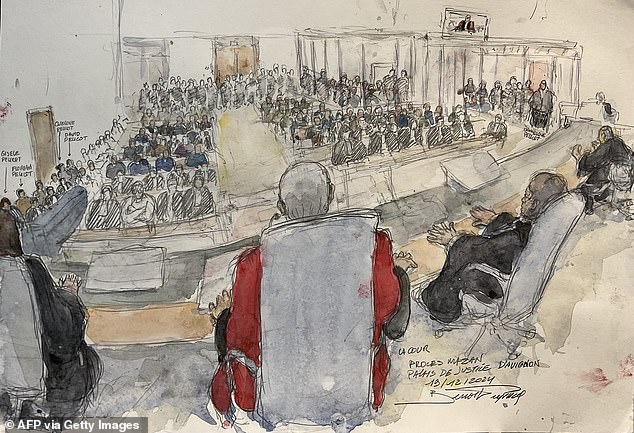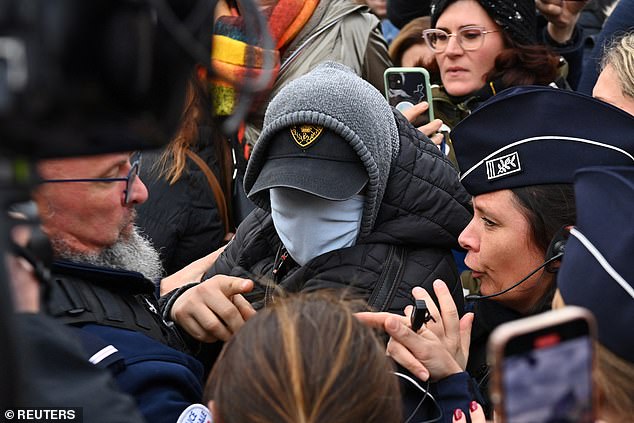Gisele Pelicot faces the ordeal of going through her trial again when it is revealed that up to ten defendants are considering appealing the ruling.
Beatrice Zavarro, Dominique Pelicot’s lawyer, said he could be among those considering appealing, which would mean challenging his 20-year prison sentence for orchestrating and committing the mass rape of his now ex-wife.
He will likely die behind bars.
Under French law, defendants have the automatic right to force a new trial through the right of appeal.
Speaking outside court after the sentences were handed down yesterday, Pelicot’s lawyer said his client was “surprised” by the judges’ decision to give him the maximum sentence, as well as the suggestion that they could hold him longer if he still would be considered a security threat.
Zavarro notes that a decision has not yet been made on whether Pelicot will file an appeal, which it may do within the next ten days.
The historic trial in Avignon, southern France, lasted three months and took place before five judges.
51 men were sentenced to more than 400 collective years behind bars and all of Pelicot’s accomplices were convicted of sexual crimes and 46 convicted of rape, two of attempted rape and two of sexual assault.
Gisele Pelicot, victim of a mass rape orchestrated by her then-husband Dominique Pelicot in their home in the town of Mazan, southern France, speaks to journalists, surrounded by family and her lawyers, following the verdict in the trial against Dominique Pelicot and 50 co-defendant, in the Avignon court, France, December 19, 2024

This court sketch taken on December 19, 2024 in Avignon shows the court during the hearing of the court’s verdict that sentenced Dominique Pelicot to the maximum sentence of 20 years in prison.

Gisele Pelicot leaves the courthouse surrounded by French police and journalists after the verdict in the trial against Dominique Pelicot and 50 co-defendants, in Avignon, France, on December 19, 2024.
Upon appeal, a new trial would involve a jury and would be shorter than the first trial.
However, it would be an added strain for brave Gisele, 72, who told cameras yesterday that the ordeal had been “a very difficult test for me”.
Meanwhile, her lawyer said that in the event of an appeal, she would not have to testify again but would want to take an “active part” in the trial.
At the same time, feminist groups that supported Gisele throughout the trial criticized the sentence, claiming it was too lenient.
Gisele’s children also criticized the “low” sentences given to some of the men who raped their mother.
They deplored that “it is not possible”, since a convicted rapist was sentenced to only five years in prison.
Firefighters, soldiers, truck drivers, a DJ and a journalist were among those found guilty of raping and sexually abusing Gisele at the behest of her husband for a decade, all without her knowledge.
The defendants hid behind masks and hoods as they entered court this morning, and several returned this afternoon after receiving sentences equivalent to or less than those they already served.

Serial rapist Dominique Pelicot will likely die behind bars after being sentenced to 20 years in prison for the campaign of abuse he and dozens of strangers carried out against his wife Gisele.

In a selfie taken by her cruel and abusive spouse, Gisele is seen smiling at the camera held by her then-spouse in a sun-drenched marina.

Gisele Pelicot arrives in front of the courthouse before a verdict is issued in the Pelicot case on December 19, 2024 in Avignon, France.

A man hiding his face is surrounded by French police, journalists and protesters as he leaves after the verdict in the Dominique Pelicot trial.
Despite the possibility of an appeal, Pelicot could face another embarrassing trial as investigators believe the depraved 72-year-old may be responsible for the rape and murder of Sophie Narme, a real estate agent, in 1991.
Detectives are investigating the cold case that bears a striking resemblance to an attempted rape of a 23-year-old real estate agent known as Marion in 1999.
She fought off her attacker and Pelicot’s DNA was later recovered at the scene, although he maintains he did not try to rape her.
It comes as psychologists who interviewed Pelicot explained his complex psychological problems, positing that the sexual abuse he claimed to have experienced as a child likely “sharpened” the traits that led him to become the man who so egregiously abused his own wife.


